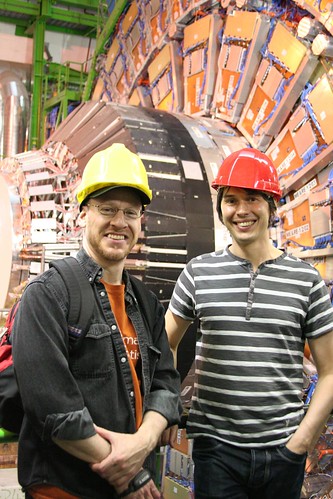In the midst of a lot of bad science news (though to be fair there’s some good news, too) comes some great news: in the UK, students taking A-level math and science has gone way up. There’s been a 40% jump in math, and 20% each in physics and chemistry over the past 5 years.
Why? No doubt it’s at least partly because employers need people highly-trained in sciences – our new technology won’t invent itself, folks (the T-1000 notwithstanding).
But the UK newspaper The Guardian (and the BBC as well), reporting on this, wonders if perhaps there is one man behind this: Brian Cox.
Brian is a scientist, a speaker, a science popularizer, and has hosted several TV shows, including the wildly popular “Wonders of the Solar System” and “Wonders of the Universe”. Brian used to be in a rock band, and has the sort of Beatles-esque look, charm, and talent that makes his work very compelling.
 Full disclosure: Brian and his wife, Gia, are friends of mine. I’ve done a few things with Brian in the past (a podcast taped at the Large Hadron Collider, for example – that picture here is the two of us deep inside the LHC – and a fun bit on NASA’s Deep Impact mission for a BBC show). But that’s not why I’m supporting him here; in fact, it’s the reverse: I like him because he’s a good guy doing good work.
Full disclosure: Brian and his wife, Gia, are friends of mine. I’ve done a few things with Brian in the past (a podcast taped at the Large Hadron Collider, for example – that picture here is the two of us deep inside the LHC – and a fun bit on NASA’s Deep Impact mission for a BBC show). But that’s not why I’m supporting him here; in fact, it’s the reverse: I like him because he’s a good guy doing good work.
It’s not hard to see why The Guardian – and the people interviewed in that article – might say Brian is behind this recent jump in sciencophilia. His impact on the culture of science in the UK is both wide and deep. It’s probably not possible to know the exact influence he’s had, but when you look at how many people were drawn into science by Carl Sagan 30 years ago, it’s not out of the question that Brian really has taken up that mantle. As have many others, as I’m sure my Hive Overmind Discover Magazine co-blogger and science writer Carl Zimmer would agree, too.
There are times I despair for my own country because of the copious and pernicious attacks on science, but if what The Guardian says is true, it means science popularization may be stemming that tide, or at least holding it back a bit. Making science understandable, comprehensible, even fun, is having a more profound and very real impact on individuals. It may even be inspiring an interest in math and science, and causing people to study these fields further.
And that, my friends, is exactly the whole point.
Related posts:
- TV as a source of science inspiration
- Geek calendar
- Cox on TED
- Astrologers jump on Cox